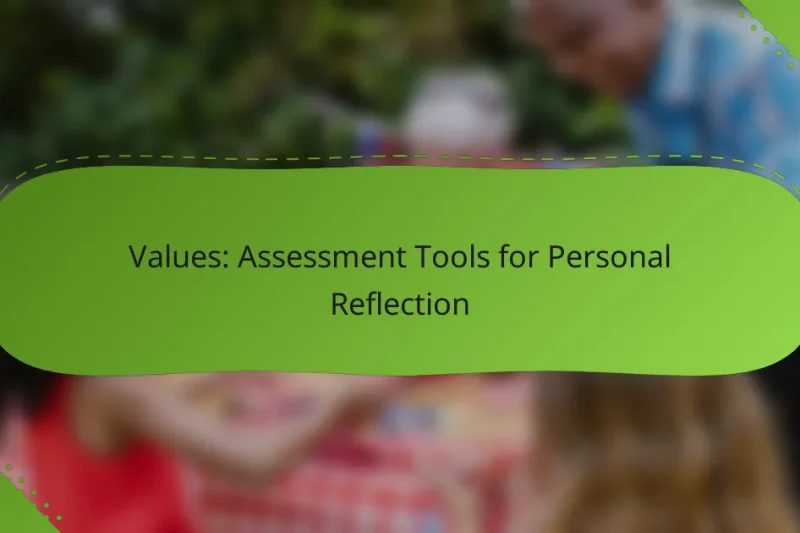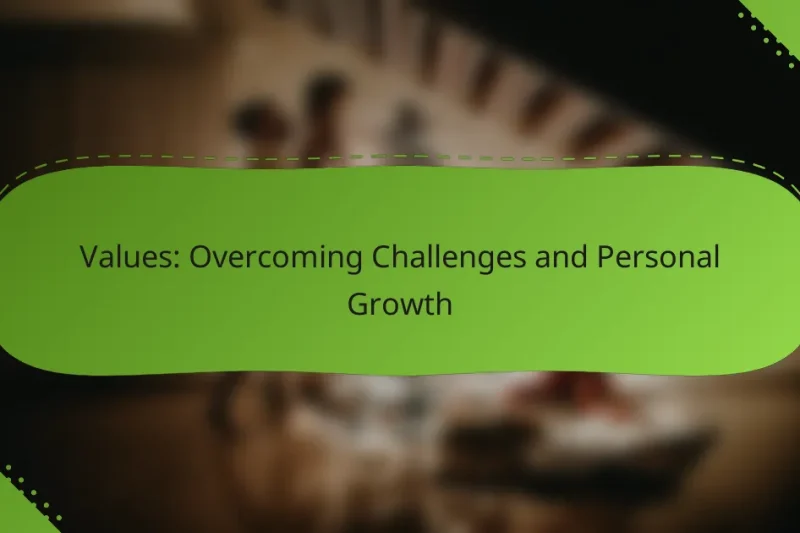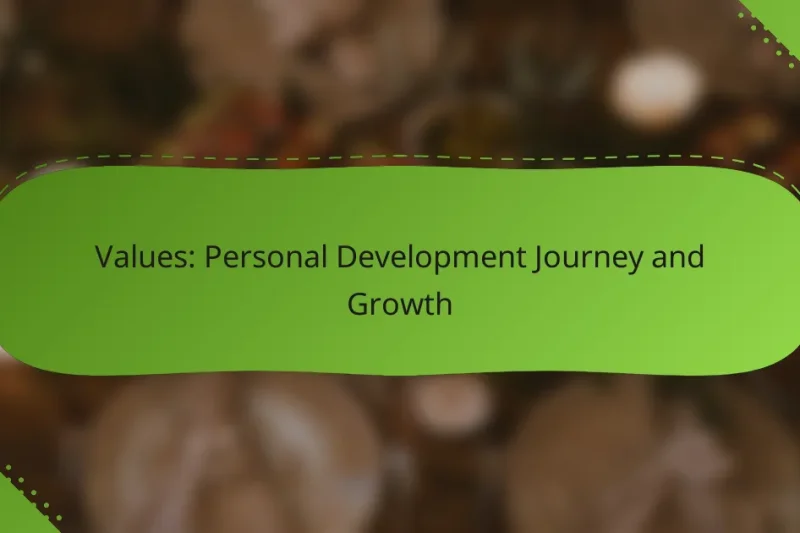Assessment tools for personal reflection are essential for individuals seeking to understand their values, strengths, and … Values: Assessment Tools for Personal ReflectionRead more
Values for Personal Growth
Values are essential for personal growth, serving as guiding principles that shape our decisions and actions. Core values such as self-awareness, resilience, empathy, integrity, and a growth mindset help individuals navigate their journey toward self-improvement and fulfillment. By aligning our choices with these values, we can foster meaningful development and lead more fulfilling lives.
Values: Overcoming Challenges and Personal Growth
Values are essential in overcoming challenges, as they provide a guiding framework for decision-making and resilience. … Values: Overcoming Challenges and Personal GrowthRead more
Values: Life Goals, Meaning, and Purpose
Understanding your life goals is essential for creating a meaningful and purposeful existence. By identifying what … Values: Life Goals, Meaning, and PurposeRead more
Values: Personal Development Journey and Growth
Values are essential in guiding personal development, providing a framework for individuals to navigate their lives … Values: Personal Development Journey and GrowthRead more
Values: Self-Improvement Strategies and Techniques
Self-improvement is a vital journey that empowers individuals to enhance their personal growth through structured strategies … Values: Self-Improvement Strategies and TechniquesRead more
Values: Resilience Building and Strengthening
Building resilience within communities is essential for effectively navigating challenges and recovering from setbacks. This involves … Values: Resilience Building and StrengtheningRead more
Values: Life Transformation and Alignment
Values are essential in transforming lives, particularly in urban settings, as they guide behaviors and cultivate … Values: Life Transformation and AlignmentRead more
What are the core values for personal growth?
The core values for personal growth include self-awareness, resilience, empathy, integrity, and a growth mindset. These values serve as foundational principles that guide individuals in their journey toward self-improvement and fulfillment.
Self-awareness
Self-awareness is the ability to recognize and understand your own emotions, thoughts, and behaviors. It is crucial for personal growth as it allows you to identify your strengths and weaknesses, enabling targeted improvement.
To enhance self-awareness, consider keeping a journal to reflect on your daily experiences and feelings. Regular feedback from trusted friends or mentors can also provide valuable insights into your behavior and impact on others.
Resilience
Resilience is the capacity to recover quickly from difficulties and setbacks. It is essential for personal growth because it helps you navigate challenges and maintain motivation in the face of adversity.
Building resilience involves developing coping strategies, such as problem-solving skills and stress management techniques. Engaging in physical activity and maintaining a supportive social network can also bolster your ability to bounce back from challenges.
Empathy
Empathy is the ability to understand and share the feelings of others. It plays a significant role in personal growth by fostering better relationships and enhancing communication skills.
To cultivate empathy, practice active listening and try to see situations from others’ perspectives. Volunteering or engaging in community service can also deepen your understanding of diverse experiences and challenges faced by others.
Integrity
Integrity involves adhering to moral and ethical principles, ensuring that your actions align with your values. It is vital for personal growth as it builds trust and credibility with yourself and others.
To strengthen your integrity, set clear personal values and hold yourself accountable to them. Regularly evaluate your decisions and actions to ensure they reflect your core beliefs, and be willing to make amends when you fall short.
Growth mindset
A growth mindset is the belief that abilities and intelligence can be developed through dedication and hard work. This perspective is crucial for personal growth as it encourages continuous learning and resilience in the face of challenges.
To foster a growth mindset, embrace challenges as opportunities for growth rather than obstacles. Seek feedback and view criticism as a chance to improve, and celebrate small achievements along the way to reinforce your progress.
How can values enhance personal development?
Values play a crucial role in personal development by providing a framework for decision-making, guiding actions, and shaping relationships. By aligning your choices with your core values, you can foster growth and achieve a more fulfilling life.
Improved decision-making
Values enhance decision-making by serving as a compass that directs your choices. When faced with options, reflecting on your values can help clarify which path aligns best with your beliefs and goals. For example, if integrity is a core value, you may choose to reject a job offer that requires unethical behavior, even if it offers a higher salary.
To make value-driven decisions, consider creating a list of your top five values. When confronted with a significant choice, evaluate how each option aligns with your values. This approach can lead to more satisfying outcomes and reduce regret.
Stronger relationships
Strong relationships are often built on shared values, which foster trust and understanding. When you and others prioritize similar principles, it creates a solid foundation for collaboration and support. For instance, friendships based on mutual respect and honesty tend to be more resilient during conflicts.
To strengthen your relationships, engage in open conversations about values with friends, family, or colleagues. This dialogue can reveal common ground and deepen connections. Additionally, be mindful of respecting differing values, as this can enhance empathy and tolerance.
Increased motivation
Aligning your actions with your values can significantly boost motivation. When you pursue goals that resonate with your core beliefs, you are more likely to stay committed and energized. For example, if you value personal growth, you might be motivated to enroll in courses or seek new experiences that challenge you.
To harness this motivation, regularly revisit and reflect on your values. Set specific, value-aligned goals and track your progress. Celebrate small achievements to maintain enthusiasm and reinforce your commitment to personal growth.
What practices support value integration?
Practices that support value integration include techniques that help individuals reflect on their beliefs and align their actions with their core values. Engaging in activities such as journaling, mindfulness meditation, and goal setting can significantly enhance this process.
Journaling
Journaling is a powerful tool for value integration, allowing individuals to articulate their thoughts and feelings. By regularly writing about experiences and reflections, one can identify patterns that reveal underlying values.
To get started, set aside 10-15 minutes daily to write without judgment. Focus on specific events or feelings and explore how they relate to your values. This practice can help clarify what truly matters to you.
Mindfulness meditation
Mindfulness meditation fosters awareness of the present moment, which can aid in recognizing and integrating personal values. This practice encourages individuals to observe their thoughts and feelings without attachment, promoting a deeper understanding of oneself.
Begin with short sessions of 5-10 minutes, gradually increasing the duration as you become more comfortable. Focus on your breath and gently redirect your attention when distractions arise, allowing insights about your values to surface naturally.
Goal setting
Goal setting is essential for translating values into actionable steps. By establishing clear, measurable goals that align with your values, you create a roadmap for personal growth and fulfillment.
Use the SMART criteria—Specific, Measurable, Achievable, Relevant, Time-bound—to define your goals. For instance, if one of your values is health, a goal could be to exercise three times a week for 30 minutes. Regularly review and adjust your goals to stay aligned with your evolving values.
How do cultural contexts influence personal values?
Cultural contexts significantly shape personal values by providing frameworks through which individuals interpret their experiences and make decisions. These frameworks can vary widely, affecting everything from individual aspirations to community responsibilities.
Individualism vs. collectivism
Individualism emphasizes personal freedom and self-reliance, often valuing personal achievements over group goals. In contrast, collectivism prioritizes the needs and goals of the group, fostering a sense of belonging and community responsibility.
For example, in many Western cultures, individualistic values may encourage people to pursue personal ambitions, while in many Asian cultures, collectivist values might promote family obligations and community welfare. Understanding these differences can help individuals navigate their personal growth within their cultural context.
Religious beliefs
Religious beliefs play a crucial role in shaping personal values by providing moral guidelines and a sense of purpose. Different religions can influence values such as compassion, honesty, and respect for others, which can vary significantly across cultures.
For instance, a person raised in a predominantly Christian culture may prioritize values like charity and forgiveness, while someone from a Buddhist background might emphasize mindfulness and compassion. Recognizing these influences can enhance one’s personal growth journey.
Societal expectations
Societal expectations can dictate what is considered acceptable behavior and success within a community. These norms often influence personal values by establishing benchmarks for achievement and social interaction.
In many societies, there may be pressure to conform to traditional roles, such as pursuing specific careers or family structures. Being aware of these expectations can help individuals assess whether they align with their personal values or if they need to redefine their paths for authentic growth.
What are the challenges in aligning values with actions?
Aligning values with actions can be difficult due to various internal and external challenges. Individuals often face emotional barriers, societal pressures, and personal fears that hinder their ability to act in accordance with their core beliefs.
Fear of change
Fear of change is a significant barrier to aligning values with actions. Many people are uncomfortable with the uncertainty that comes with making changes in their lives, even when those changes align with their values. This fear can lead to inaction or a return to old habits that do not reflect one’s true beliefs.
To overcome this fear, it is essential to recognize that change is a natural part of personal growth. Start with small, manageable steps that gradually lead to larger changes. For example, if someone values health but struggles to exercise, they might begin with short walks instead of a full workout routine.
Common pitfalls include waiting for the “perfect” moment to change or trying to make too many changes at once. Instead, focus on incremental progress and celebrate small victories to build confidence and reduce fear. Remember, aligning actions with values is a journey, not a sprint.






